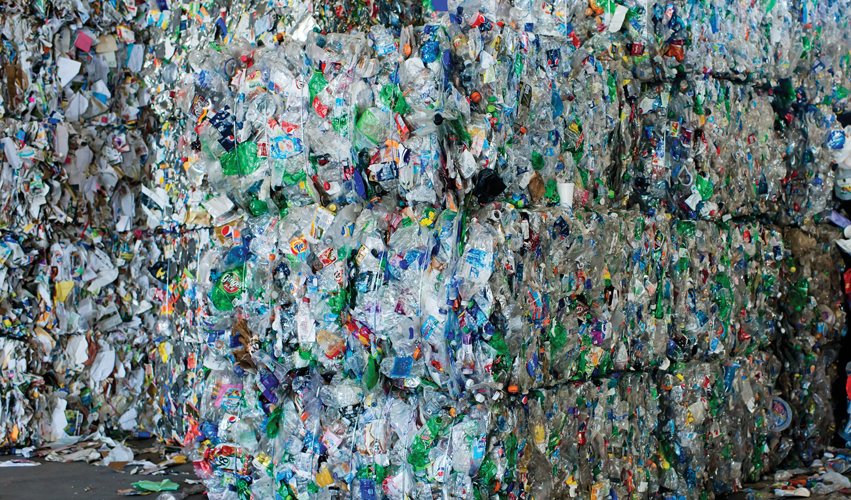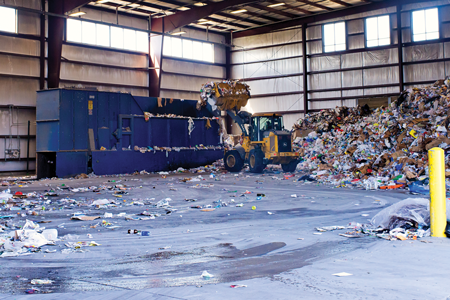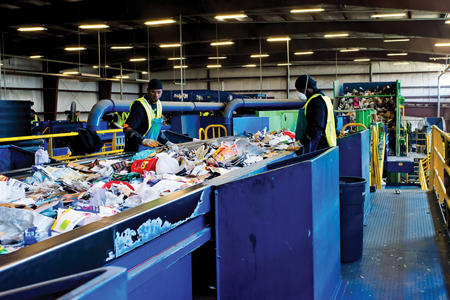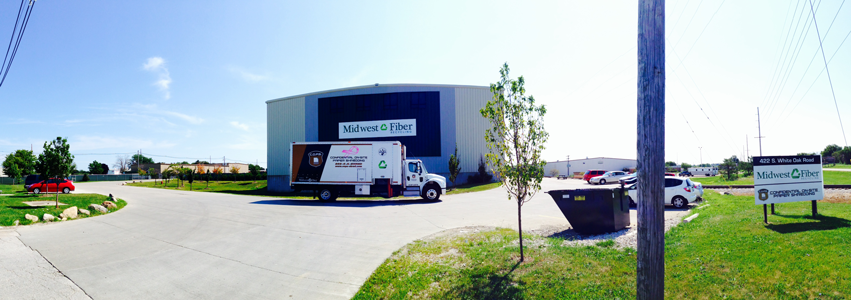
Having brought a personal touch to area recycling since 1990, Midwest Fiber shows no sign of slowing down.
Twenty-six years ago, Ron Shumaker decided to buy a small paper recycling company in Decatur, Illinois. In the years since, the family-owned business has expanded to bring recycling resources to a range of communities interested in participating in this emerging movement. Today, with Shumaker’s sons Mike and Todd at the helm, Midwest Fiber Recycling serves most of the state of Illinois south of Chicago, as well as a sizeable part of Indiana. As the push for recycling and overall sustainability continues to gain traction, it has become a pivotal force in providing this region the means to reduce landfill waste, reuse materials and resources, and sustain the environment for future generations.
It Runs in the Family
“My dad always had an entrepreneurial spirit,” explains Todd Shumaker, sales and marketing director and co-owner of Midwest Fiber. “He would look through the newspaper consistently for any opportunities, and he came across a small ad that said: ‘own your own business.’ It happened to be a small recycling company in Decatur. Both of my grandparents owned their own businesses, and I think they helped him make that leap of faith to go into business on his own.”

It turned out to be optimal timing, as the benefits of recycling were just coming to light in the public eye. The elder Shumaker started with a handful of employees and a small facility for sorting and processing recyclables, and the business grew, slowly but steadily. After expanding to a facility five times larger, the family began to appreciate their business’ true potential. “That’s where we really started to see our growth happen,” Todd Shumaker explains. “[It’s] where we started to reach further outside of Decatur and realize this was a bigger business than we imagined.”
Midwest Fiber now operates facilities in Peoria, Bloomington, Decatur and Springfield—plus one in Terre Haute, Indiana—where it handles the collection, sorting and processing of paper, plastic, cardboard and other recyclable materials. As Shumaker notes, there are two sides to the business: the intake and recycling of materials, and the distribution of recycled products back into the market. “We have the customer side… the people who want to recycle,” he explains. “[They] want to be ‘greener’… to figure out ways to not throw things away anymore. And once we have all these customers who want to recycle, we have to be able to get rid of that product. So we have to find people who can use it.”
In this sense, the recycling business operates on an international scale. Shumaker says about half of recycled cardboard goes to China, for example, where it is used in packaging for shipments back to the United States. Each month, Midwest Fiber sees roughly 11,000 tons of recyclable materials pass into and out of its facilities. “And if you start to do the math of how many trucks that is and how many trees it saves… the number is so large, people go ‘That can’t be true!’ But it is.”
 Moving with the Stream
Moving with the Stream
Over time, Shumaker and his team took notice of a trend in the recycling world: customers wanted the process to be easier and more efficient. The solution was single-stream recycling, where materials can be comingled and taken to the facility in a single, mixed bin. “It happened first at the house, where people wanted to recycle at home,” he explains. “And if you have six bins at somebody’s house, it’s very tough to separate… You didn’t get very high participation.”
While the switch to single-stream recycling has boosted customer participation, Shumaker says it’s also increased the importance of fast and efficient processing—and the industry has had to adapt. “It really puts that challenge of sorting back onto the recycling company,” he notes. “So we have to invest millions of dollars to separate those materials back out… We provide that.”
As the company realized the extent to which recyclables were being shipped to distant locations—which offered larger single-stream facilities capable of handling the volume of material—Midwest Fiber developed a sizeable materials recovery facility in 2011—the first of its kind in central Illinois. “We saw an opportunity for us to approach it from what we call a ‘hub-and-spoke’ approach,” explains Shumaker. “We made the decision to make Bloomington-Normal the ‘hub’ of the materials recovery facility. And with that, we have ‘spokes’ that go out so we can collect the material from about a 100-mile radius… All that funnels back to our facility.”
At the materials recovery facility, the sorting process is fast and efficient. After plastic bags and other contaminants (from golf balls and medical waste to food and other non-recyclables) are removed by hand, the materials travel down a conveyor belt, where they are separated by falling through holes of varying sizes designed to capture specific items. Strong magnets and optical sorters—which use infrared light to read certain types of plastics and blasts of air to separate different materials—are among the technologies designed to aid in this process.
Shumaker says the facility has opened up opportunities not only for additional customers, but for partnerships with other companies and organizations that can utilize its services. “In central Illinois, most communities aren’t large enough to have their own material recovery facility, because it takes so much volume and so many dollars to build,” he notes. “So we made that big leap of faith that if we built it, they would come. And fortunately, we’ve been very happy with that.”

Branching Out
Five years ago, Midwest Fiber began partnering with local composting facilities to reduce food waste. Businesses with significant food waste, such as restaurants and large companies with cafeterias, sign up to have their scraps collected and transported for composting at facilities like those at Illinois State University Farm in Bloomington-Normal and LHF Compost in Peoria. While this doesn’t always result in significant cost savings for customers, Shumaker says, it is a step forward in finding more productive ways to use the waste produced by businesses every day.
“I think that’s one area that we will see continuing involvement,” he explains. “A lot of people are looking at food waste, as there may be better uses than compost. There are more technical things that can be done to help create energy… The customers we have are very dedicated [to seeing] material diverted from the landfill. For them, it’s the environmental benefit over the cost savings.”
While composting is a more recent endeavor, Midwest Fiber has handled secure paper shredding and document destruction through its sister company, Confidential On-Site Paper Shredding (C.O.P.S.), since 2003. Beginning with a single truck in Bloomington-Normal, C.O.P.S. has expanded to encompass seven shredding trucks and a service territory similar to Midwest Fiber’s. The process is secure and confidential, utilizing locked storage bins and shredding machines within the trucks to ensure any and all sensitive information is thoroughly destroyed.
“Nothing will leave anybody’s parking lot without being destroyed,” declares Mike Kirlin, C.O.P.S. business development manager. “Our philosophy is: ‘What can we do to help the customer secure their confidential stuff?’ Because in this day and age, you have to be so careful.” On site, the company collects pre-filled bins with storage capacities from a few pounds to 300 pounds, destroying the materials inside in their specially-designed trucks. That means a lot of shredded paper, as well as CDs, microfilm, hard drives and other electronic materials, which are thoroughly destroyed and brought back to Midwest Fiber to be recycled. The entire process takes place in front of the customer, who can ensure it adheres to applicable state and federal regulations relative to confidential document destruction.
In addition, C.O.P.S. is certified by the National Association for Information Destruction (NAID), which holds it to strict standards for regulatory compliance, including yearly audits. “[Customers] get a certificate of destruction,” Kirlin explains. “So you can keep that on file showing that you used a NAID-certified company that followed proper procedures.”
C.O.P.S.’ primary focus, he adds, is to make sure their customers’ needs are being met. “We’ve worked really hard to build good relationships,” he says. “You just need to go in and make sure they understand what you offer and how you can help them.”
The Local Touch
While Midwest Fiber has an expansive regional reach, it remains at its core a homegrown fmily business, which reinforces the bond between the company and its customers. “We’ve got roots here,” Shumaker explains. “We’ve been in the area; we’re familiar with our customers. And I think the way we do business is the way customers want us to do business. It’s the relationship side of the business that’s set us apart… That was a decision my dad made years ago.”
And more than a quarter of a century later, the company he built is still thriving. After retiring in April, Ron Shumaker was awarded the Lifetime Achievement Award by the Illinois Recycling Association in July. Meanwhile, Midwest Fiber Recycling reported 2015 as a record year: it diverted more than 338 million pounds of material from the landfill—saving enough energy to power a 1000-watt electric heater for more than 2.4 billion hours, and sparing more than 2.3 million trees from being cut down.
All the while, the Shumakers and their team continue to evolve with an ever-changing industry while educating the public on the benefits of recycling. “We try to make sure we can adapt,” Shumaker says. “It helps [to be] in front of our customers to understand what they are asking for and what their needs are, so we can continue to change with them.” iBi
Midwest Fiber Recycling is central Illinois’ largest full-service recycler, recycling over five million pounds of materials every week. For more information, visit midwest-fiber.com. To learn more about Confidential On-Site Paper Shredding, visit cops-shred.com.


